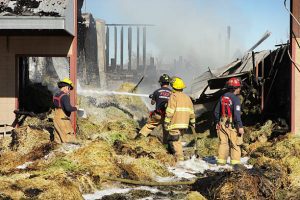| Arson Investigator Key Stats | |
|---|---|
| Avg. Salary / year | $87,440 |
| Avg. Pay / hour | $42.04 |
| Education | 1-2 Years |
| Job Outlook | 6% |
| Total Employed | 14,050 |
An arson investigator determines the cause of a fire by examining the scene of the blaze, interviewing witnesses, and communicating with fire fighters.
If you have an good eye for detail and an interest in law enforcement then you might like to become an arson investigator.
An arson investigator’s role is to find the source of a fire in the case of suspicious circumstances.
Fire fighters will alert law enforcement when they suspect arson, or notice a fire not behaving in the way it should.
An arson investigator will also be responsible for collecting evidence to use in any legal proceeding which may result.
They may also be called upon to testify in court as a witness.
Go to Page Section:
Education Requirements to Become an Arson Investigator
The best entrance to a career as an arson investigator is a four year bachelor degree.
Your major should be in law enforcement, subjects in engineering could be complementary.
A degree in chemistry or biology may see you able to become employed in this field.
While you’re studying you might like to volunteer for your local fire station, as this will start to broaden your knowledge of fires.
National certification is offered by the National Association of Fire Investigators, or
NAFI.
To become certified you must meet the education qualifications and take an exam.
Certified investigators must also take part in continuing professional development to keep their certification current.
Arson Investigator Job Description
When you become an arson investigator, you open the door to many excellent job opportunities.
Most arson investigators work for law enforcement agencies at both the state and national level.
When a fire seems suspicious, or someone is hurt or killed, the arson investigation squad will be called to the scene.
An arson investigator will begin by surveying the site and collecting any evidence that shows arson took place, as well as anything that gives clues as to the identity of the arsonist.
This evidence may later be used in court.
After analyzing the scene, the will go on to speak with the fire fighters that attended the blaze.
They will also interview any witnesses.
Just like a regular crime scene investigator, they may send samples off for further testing, and spend some time analyzing what they find.
Usually an arson investigator will work closely with other law enforcement professionals.
Working as an arson investigator, you may be called on to work odd hours or over weekends.
Often you would be on call, and required to go to work when a fire occurs.
Arson investigators may also be employed by insurance agencies to investigate fires to property or vehicles that may appear suspicious.
Here are some of the tasks of an arson investigator:
- Investigate the scene of a suspicious fire
- Take samples of evidence
- Determine if a fire was arson
- Communicate with law enforcement officials
- Writing reports on findings
- Testifying in court as a witness
Arson Investigator Salary and Career Path
Many who work as arson investigators actually begin their career in other areas of law enforcement.
It’s likely that when you start working you’ll need to spend 1-2 years working as a police officer before you are promoted to the arson squad as an investigator.
You might also start your career working as an assistant to other arson investigators.
If you were to work for an insurance agency or fire department, you might start working as an arson investigator right away.
With time, you might move on to more challenging roles within law enforcement.
Job prospects for an arson investigator are good.
Being that this job is part of law enforcement, employment is also secure.
There are good opportunities for arson investigators across the country.
The average salary for an arson investigator is around $77,000 a year according to SimplyHired.com.
Those just beginning in law enforcement would earn less, while those with greater responsibilities could have the potential to earn more.
Here are some similar career paths you might consider:
- Crime Scene investigator
- Fire Inspector
- Forensic Scientist
- Firefighter
- Police Officer
- Detective
- Insurance Claim Adjuster
If you’re interest in law enforcement, and are intrigued by fires and crime then you might like to become an arson investigator.
It’s a good way to embark on a career that is challenging and fast-paced, and also offers good prospects and salary as well.
![]() The below information is based on the 2024 BLS national averages.
The below information is based on the 2024 BLS national averages.
National Average Salary
$87,440Average Salary by State
| State | Avg. Annual Salary |
|---|---|
| Alabama | $55,070 |
| Arizona | $74,090 |
| Arkansas | $62,590 |
| California | $99,980 |
| Connecticut | $77,580 |
| Delaware | $64,550 |
| Georgia | $66,740 |
| Idaho | $74,460 |
| Illinois | $76,950 |
| Indiana | $66,870 |
| Iowa | $77,580 |
| Kansas | $67,330 |
| Kentucky | $55,110 |
| Louisiana | $76,880 |
| Maine | $55,430 |
| Maryland | $84,860 |
| Massachusetts | $90,140 |
| Michigan | $83,150 |
| Minnesota | $85,350 |
| Mississippi | $52,990 |
| Missouri | $91,820 |
| Nebraska | $73,750 |
| Nevada | $92,800 |
| New Hampshire | $81,450 |
| New Jersey | $73,070 |
| New Mexico | $66,130 |
| New York | $79,740 |
| North Carolina | $66,740 |
| North Dakota | $75,810 |
| Ohio | $80,230 |
| Oklahoma | $51,340 |
| Oregon | $110,240 |
| Pennsylvania | $67,260 |
| Rhode Island | $75,330 |
| South Carolina | $63,170 |
| Tennessee | $65,400 |
| Texas | $80,240 |
| Utah | $70,770 |
| Vermont | $72,750 |
| Virginia | $71,210 |
| Washington | $112,580 |
| West Virginia | $52,730 |
| Wisconsin | $75,680 |
| Wyoming | $81,260 |
| Puerto Rico | $45,930 |
The highest-paying state in this field is Washington, with an average salary of $112,580.
Here are the five states with the highest salaries in the field:
* Employment conditions in your area may vary.
Frequently Asked Questions
What is an Arson Investigator?
Arson investigators are professionals specialized in determining the causes of fires and explosions.
In order to establish what caused a fire, arson inspectors collect evidence from the scene, interview witnesses and send evidence to the lab.
They also have the responsibility of documenting the evidence and keeping detailed records.
Fire inspectors can also be called to testify in court.
They may also exercise police powers and be able to arrest suspects and carry a weapon.
Arson inspectors may also work evenings, weekends and during holidays if they have to respond at the scene of a fire.
How much does an Arson Investigator make?
According to the Bureau of Labor Statistics, the median annual wage for fire inspectors and investigators was $62,510 in May of 2018.
How much an investigator makes depends on many factors, including his or her employer and level of experience.
The lowest 10 percent earned less than $39,600 per year, while the top 10 percent earned more than $83,810.
How much does it cost to become an Arson Investigator?
Arson Investigators usually have previous experience as firefighters.
They need at least a high school diploma or equivalent and receive on-the-job training in investigations.
Some jurisdictions also require firefighters to possess an EMT license.
The cost of an EMT training course ranges between $1,000-$2,000.
Firefighters are also trained at the Fire Academy.
Tuition at the Fire Academy costs around $5,300.
In order to get a better paying job or to qualify for career advancement, you should also consider getting a college degree in fire science, engineering or chemistry.
The average cost for a bachelor’s degree in fire science is around $33,000 per year for out-of-state students.
What is the demand for Arson Investigators?
According to the Bureau of Labor Statistics, the demand for fire inspectors and investigators is expected to grow by 6 percent between 2018 and 2028.
You should expect strong competition if you want to get a job as an arson inspector.
An associate’s or bachelor’s degree will improve your chances of getting hired.
How long does it take to become an Arson Investigator?
Arson Inspectors usually have previous experience as firefighters.
In order to become a firefighter, you need to participate in a recruitment fair organized by the fire department.
In order to qualify for a job as a firefighter, you need a high school diploma or GED and must be at least 18 years of age.
Qualified individuals need to pass a written test and a physical test.
Some jurisdictions also require firefighters to possess an EMT license.
EMT programs can take between several months and two years to complete, depending on the program.
Firefighters are also trained at the Fire Academy.
The Fire Academy can be completed, on average, in about 12 to 14 weeks.
Arson Investigators also receive on-the-job training which includes several months of classroom training in legal codes, guidelines for conducting an investigation, courtroom procedures, protocol, and proper use of equipment.
In order to get a better paying job or to qualify for career advancement, you should also consider getting a two-year associate degree or a four-year bachelor’s degree in fire science, engineering or chemistry.














